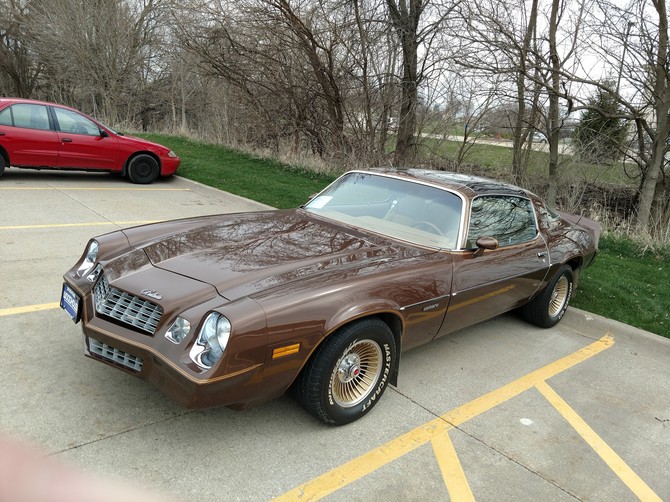1979 Base Model Camaro
1979 Chevrolet Camaro Base Model (Sport Coupe), officially designated the Sport Coupe, was the entry-level trim of the second-generation Camaro (1970–1981) produced by Chevrolet. As part of the F-body platform, it offered a blend of sporty styling and practical performance for budget-conscious buyers. The 1979 model year saw subtle updates to the Camaro's design, with the base model distinguished by its simpler aesthetics compared to higher trims like the Z28 and Berlinetta.
Overview
The 1979 Camaro Sport Coupe was built at Chevrolet's Norwood, Ohio, and Van Nuys, California, assembly plants. It featured a two-door coupe body (VIN code "87") and was identified in the VIN by the series code "1Q". Approximately 111,185 Camaros were produced for 1979, with the base model comprising a significant portion of sales due to its affordability.
Exterior
The 1979 Camaro base model retained the second-generation’s iconic long-hood, short-deck design. Key exterior features included:
- Grille: Silver (argent) upper and lower grilles, with the upper grille featuring a Chevrolet bowtie and "Camaro" script emblem affixed via studs and speed nuts.
- Bumpers: Body-colored or chrome, depending on factory configuration.
- Wheels: Standard 14-inch steel wheels with hubcaps; optional rally wheels available.
- Badging: Simple "Camaro" badges on the rear and sides, without Z28 or Berlinetta-specific trim.
The base model lacked the aggressive styling of the Z28, such as its hood scoop, spoilers, or unique decals. Optional appearance packages, like the Rally Sport (RS) package, could add two-tone paint and blacked-out grilles, but these were not standard.
Interior
The Sport Coupe’s interior prioritized functionality:
- Seating: Standard cloth or vinyl bucket seats in a range of colors (e.g., black, blue, tan).
- Dashboard: Basic instrument cluster with speedometer, fuel gauge, and warning lights. Optional Custom Interior package added upgraded materials and console.
- Features: Manual windows, manual locks, and AM radio standard. Air conditioning, power windows, and an AM/FM stereo were optional.
The base model did not include luxury features like the Berlinetta’s plush upholstery or woodgrain accents unless specifically ordered.
Powertrain
The 1979 Camaro base model offered two engine options, both paired with a standard three-speed manual transmission (a four-speed manual or three-speed automatic were optional):
- Standard: 4.1L (250 cu in) inline-six, producing 115 hp.
- Optional: 5.0L (305 cu in) V8, 2-barrel carburetor, producing 130 hp.
The 5.7L (350 cu in) V8 was not available for the base model, being exclusive to the Z28 or specific regional orders (e.g., California emissions packages). All engines were detuned for emissions compliance, reflecting the era’s regulations.
Performance
The base model’s performance was modest:
- 0-60 mph: Approximately 10–12 seconds (inline-six) or 9–10 seconds (305 V8).
- Top speed: Around 100–110 mph, depending on engine and gearing.
- Suspension: Front coil springs, rear leaf springs, with standard shocks. Optional sport suspension was available but rare.
The Sport Coupe prioritized economy over the Z28’s performance tuning.
Production and Pricing
The 1979 Camaro Sport Coupe had a base price of approximately $5,072. Total Camaro production for 1979 was 111,185 units, though exact figures for the base model are not publicly broken out. The Norwood, OH, plant (VIN code "N") and Van Nuys, CA, plant (VIN code "L") produced all Camaros, with sequential VINs indicating build order (e.g., 626222 for VIN 1Q87G9N626222).
Legacy
The 1979 Camaro base model appealed to buyers seeking style without the cost of higher trims. Its silver grille, simple trim, and reliable (if modest) powertrains made it a popular choice. Today, it is valued by collectors for its classic design and affordability for restoration projects. The base model’s versatility allows owners to customize it with aftermarket or higher-trim parts, such as Z28-style black grilles.
References
- Classic Industries, OER Parts Catalog, "1979 Camaro Grille and Emblem Specifications."
- NastyZ28.com, "1979 Camaro VIN Decoding Guide."
- Chevrolet Division, 1979 Camaro Sales Brochure.
